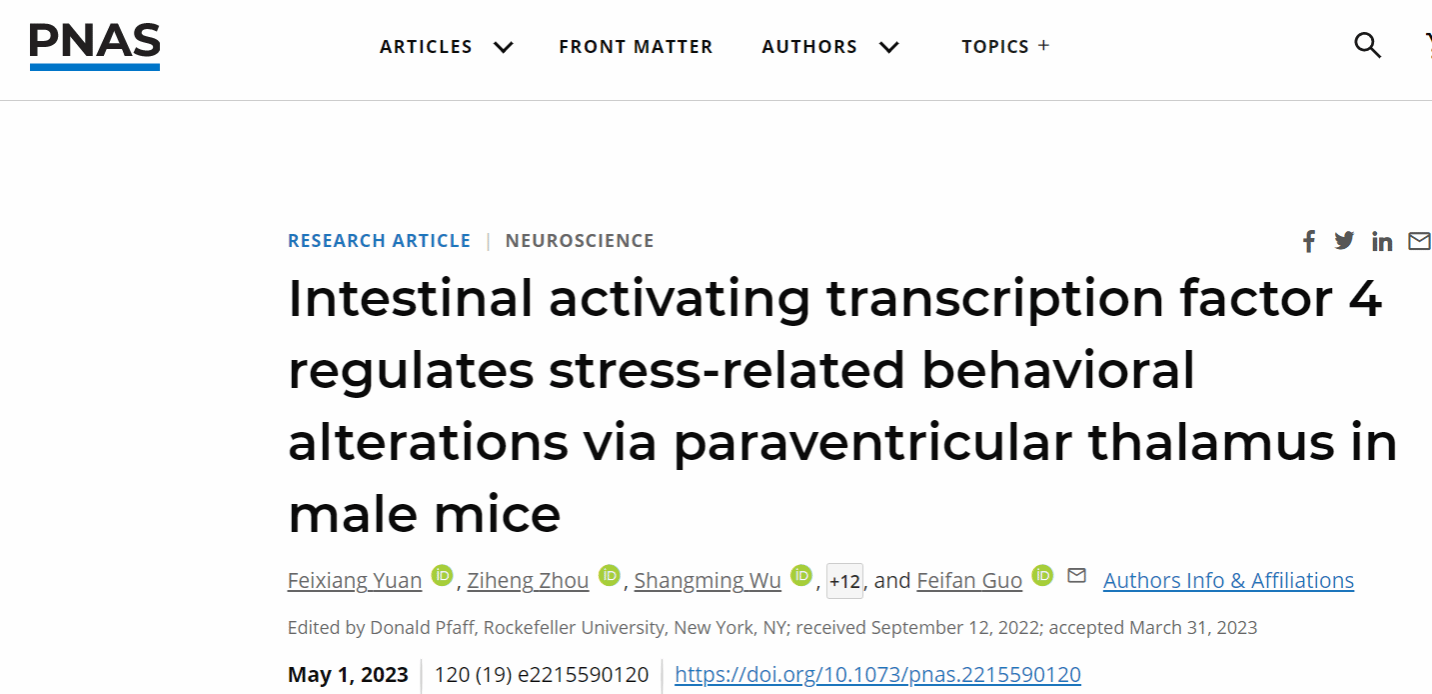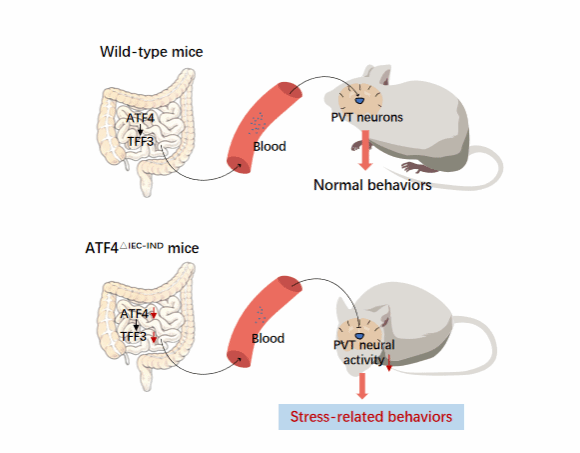On May 1st, 2023, the research team led by PI Guo Feifan from our institute published a paper titled "Intestinal activating transcription factor 4 regulates stress-related behavioral alterations via paraventricular thalamus in male mice" in the Proceedings of the National Academy of Sciences of the United States of America (PNAS). The paper discovered that the activated transcription factor 4 (ATF4) of intestinal epithelial cells regulates the activity of neurons in the paraventricular thalamus (PVT) through TFF3, thereby mediating chronic stress-related behavioral changes.

Chronic stress can cause behavioral changes such as depression and anxiety, seriously affecting people's normal lives. Currently, there are various antidepressants and anti-anxiety drugs in clinical use. However, approximately 30% of patients do not show significant effects after taking these drugs, suggesting that there may be undiscovered pathogenic mechanisms and treatment measures that need further research. Chronic stress not only affects the brain but also the peripheral organs of the body, especially the intestines. Emotions such as anxiety and depression can also affect intestinal function and the composition of the microbiota. More and more studies have found that the gut-brain axis plays an important role in anxiety and depression and chronic stress. However, the role of molecular signals of intestinal epithelial cells in this process and their regulation in the gut-brain axis still have many unanswered questions.
ATF4 is a stress-induced gene that regulates multiple physiological metabolic processes, including amino acid sensing, lipid metabolism, endoplasmic reticulum stress, and energy balance. Researchers have found that overexpression of ATF4 in C57 mouse colon epithelial cells can alleviate chronic stress-related behavioral changes, including the open field test, elevated circular maze test, and tail suspension test; while knocking out ATF4 in intestinal epithelial cells can induce stress-related behavioral changes. Further studies have revealed that the activity of glutamatergic neurons in the PVT region of mice with intestinal epithelial cell knockout of ATF4 is reduced, and selective activation of these neurons can alleviate the above behavioral changes in the knockout mice. To study the signal transmission between the gut and the brain, researchers used the RNA-Seq results of intestinal epithelial cells from knockout mice to screen for intestinal peptides that are secreted by the intestine and are highly expressed and significantly decreased. Cell-level verification showed that TFF3 can be directly regulated by ATF4 through transcription. Injecting TFF3 into mice with intestinal epithelial cell knockout of ATF4 can improve stress-related behaviors, and the related changes can be eliminated after inhibiting the activity of glutamatergic neurons in the PVT region.
Overall, this study has demonstrated the significant role of ATF4 in regulating stress-related behaviors through the intestinal-brain axis, specifically by influencing the neuronal activity in the PVT via TFF3. This research provides new insights into the regulation of behavior by the intestinal-brain axis and offers potential therapeutic strategies for stress-related diseases.
Yuan Feixiang, a young associate researcher in the Institute for Translational Brain Research of Fudan University, and Zhou Ziheng, a doctoral student at the Shanghai Institute of Nutrition and Health of the Chinese Academy of Sciences, are the co-first authors of this study. Wu Shangming, a graduate student at the Shanghai Institute of Nutrition and Health of the Chinese Academy of Sciences, also made significant contributions. Professor Guo Feifan from the Institute for Translational Brain Research of Fudan University is the corresponding author of this study. This research was supported by the National Natural Science Foundation of China (31830044, 91957207, 81870592, 82270905, 81970742, 82000764, 82170868, 81970731) and the National Key Research and Development Program Project (2018YFA0800600).
Original link:https://www.pnas.org/doi/10.1073/pnas.2215590120

Figure: The ATF4 protein in intestinal epithelial cells regulates stress-related behaviors through the TFF3-PVT intestinal-brain axis signaling pathway.